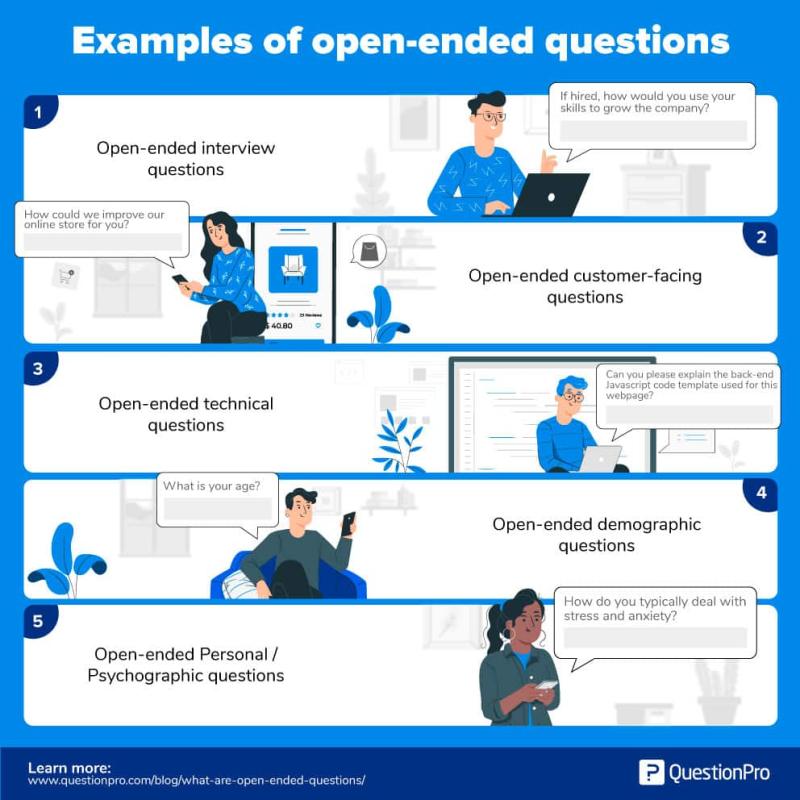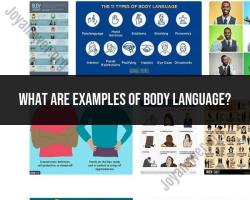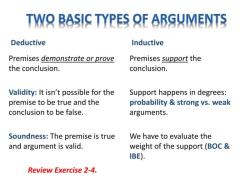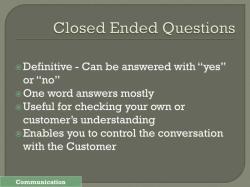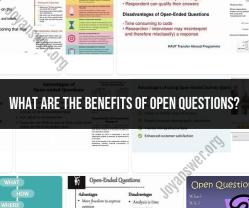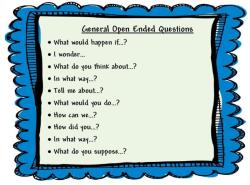What does open ended questions mean?
Open-ended questions are a type of inquiry or questioning approach that prompts a more detailed and expansive response from the person being asked. Unlike closed-ended questions, which typically elicit a brief and specific answer (often a yes or no), open-ended questions encourage individuals to provide more information, share their thoughts, and express themselves in a more comprehensive manner.
Characteristics of open-ended questions include:
Encouraging Elaboration:
- Open-ended questions invite the respondent to elaborate on their thoughts, feelings, or experiences. The goal is to obtain more detailed and nuanced information.
No Preset Response:
- These questions do not have a predetermined set of responses. Instead, they allow for a broad range of possible answers.
Promoting Conversation:
- Open-ended questions are often used in conversation to stimulate dialogue and engage the other person in a meaningful discussion.
Exploring Perspectives:
- They are effective for exploring different perspectives, opinions, or viewpoints, as they give individuals the opportunity to express themselves in their own words.
Starting with "How," "What," "Why," "Tell Me About," etc.:
- Common open-ended question starters include words like "how," "what," "why," and phrases like "tell me about," which encourage the respondent to provide a more comprehensive answer.
Examples of open-ended questions:
Closed-Ended Question: Did you enjoy the movie?
Open-Ended Question: What aspects of the movie did you find enjoyable?
Closed-Ended Question: Did you complete the project on time?
Open-Ended Question: Can you share the process you went through to complete the project on time?
Closed-Ended Question: Did you like the book?
Open-Ended Question: What were your thoughts and feelings about the book?
Open-ended questions are commonly used in various settings, including interviews, surveys, counseling sessions, and everyday conversations. They are valuable tools for gaining deeper insights, fostering communication, and encouraging individuals to reflect on and articulate their thoughts more fully.
Defining Open-Ended Questions and Their Significance in Discussions and Research
Open-ended questions are those that cannot be answered with a simple "yes" or "no" response. They encourage elaboration, exploration, and critical thinking, making them valuable tools for discussions, research, and learning.
Significance of open-ended questions:
Elicit deeper understanding: Open-ended questions allow individuals to express their thoughts, feelings, and perspectives beyond superficial answers.
Promote engagement and participation: These questions invite people to share their knowledge and experiences, fostering active involvement in discussions and research.
Uncover hidden insights: Open-ended questions can reveal unexpected perspectives, underlying motivations, and unique experiences that may not be readily apparent.
Encourage creative thinking: By prompting exploration and analysis, open-ended questions stimulate creativity and problem-solving skills.
Crafting Open-Ended Questions to Encourage Elaborate and Thoughtful Responses
Effective open-ended questions:
Start with open-ended phrases: Use phrases like "How," "What," "Why," "Explain," "Describe," or "Elaborate."
Avoid leading questions: Avoid questions that suggest a specific answer or influence the respondent's opinion.
Focus on specific topics or issues: Frame questions around specific aspects of the discussion or research topic.
Encourage elaboration and explanation: Ask questions that invite respondents to provide details, examples, and justifications.
Examples of effective open-ended questions:
"What are your thoughts on the proposed solution?"
"How has this experience shaped your perspective?"
"What factors have influenced your decision-making process?"
"Why do you believe this outcome is significant?"
"Can you explain the underlying mechanisms of this phenomenon?"
Utilizing Open-Ended Questions to Gain In-Depth Insights and Foster Understanding
Open-ended questions can be used to gain in-depth insights and foster understanding in various contexts:
Discussions: Use open-ended questions to stimulate meaningful conversations, encourage diverse perspectives, and promote active participation.
Research: Formulate open-ended questions to gather qualitative data, explore complex issues, and uncover hidden patterns or trends.
Learning: Employ open-ended questions to encourage critical thinking, prompt self-reflection, and facilitate deeper comprehension of concepts.
Strategies for utilizing open-ended questions effectively:
Active listening: Listen attentively to responses, showing genuine interest and encouraging further elaboration.
Use follow-up questions to clarify points, probe deeper into specific aspects, and encourage further exploration.
Respectful dialogue: Maintain a respectful and non-judgmental environment, allowing diverse perspectives without imposing personal biases.
Synthesis and analysis: Synthesize responses, identify recurring themes, and analyze patterns to gain a comprehensive understanding.
By carefully crafting and utilizing open-ended questions, individuals can engage in meaningful discussions, conduct insightful research, and foster deeper understanding in various contexts.
